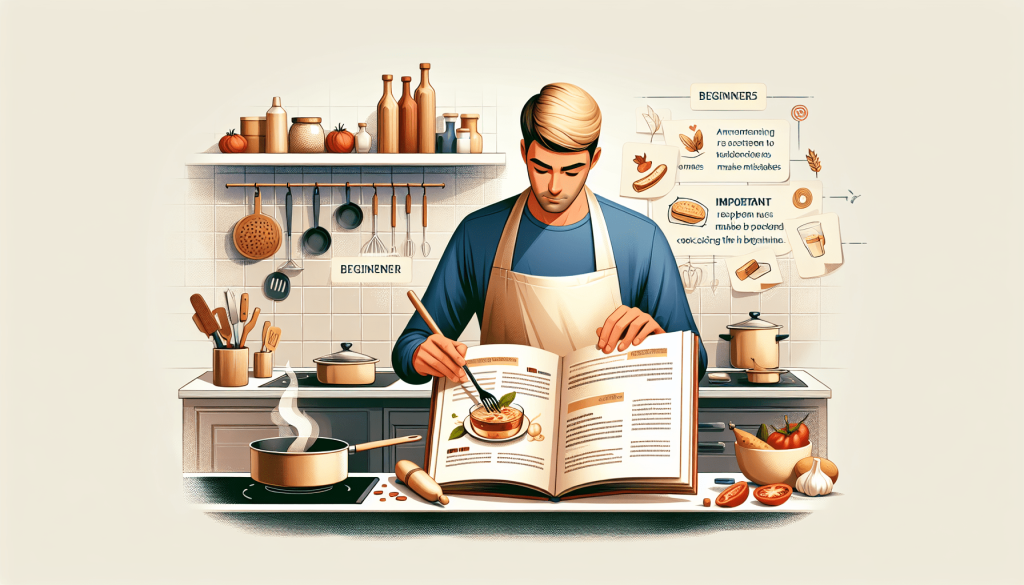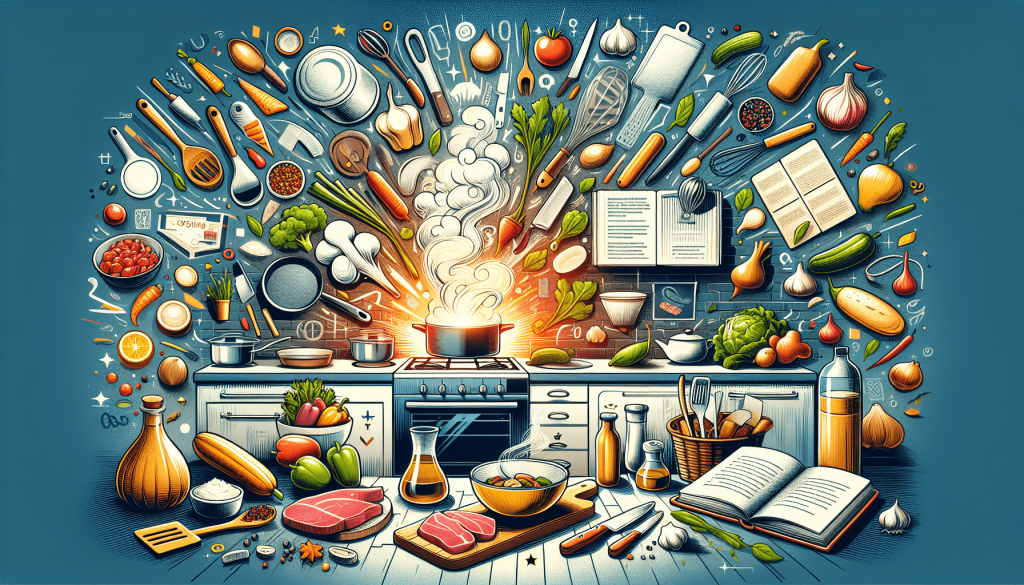Are you a beginner in the kitchen, eager to improve your cooking skills? Look no further! This article presents you with 10 essential cooking tips that will set you on the path to becoming a culinary wizard. From mastering the art of seasoning to perfecting knife skills, these tips will help you build a strong foundation in the kitchen and unleash your inner chef. So, grab your apron and get ready to embark on a delicious journey of culinary discovery!

1. Understand the Basics of Heat
Different types of cooking heat
When it comes to cooking, understanding the basics of heat is essential. There are different types of cooking heat that you should be aware of. The most common types include direct heat, such as grilling or broiling, and indirect heat, such as baking or roasting. Each type of heat produces different results, so it’s important to know when to use each method.
Understanding the heat levels
Heat levels play a crucial role in cooking. Low heat is ideal for slow cooking, like simmering or braising, while medium heat is great for sautéing and stir-frying. High heat is perfect for searing or boiling. Understanding the heat levels allows you to control the cooking process and achieve the desired results in your dishes.
How to control heat while cooking
Controlling the heat while cooking is the key to successful culinary endeavors. You can control the heat by adjusting the flame on your stove, using the right cookware, or even by using different cooking techniques. For example, covering a pan with a lid can help retain heat and cook your food faster. It’s also important to keep an eye on the heat and adjust it as needed throughout the cooking process to prevent burning or overcooking.
2. Invest in Essential Kitchen Tools
Basic utensils like knives, chopping boards, and measuring cups
Investing in essential kitchen tools is a wise decision for any beginner cook. Basic utensils like knives, chopping boards, and measuring cups are indispensable. A good-quality chef’s knife will make your prep work easier, while a sturdy chopping board provides a safe and clean surface for slicing and dicing. Measuring cups ensure accurate ingredient proportions, which is crucial for successful recipes.
Cookware essentials like pots, pans, and baking sheets
Having the right cookware is equally important. Pots and pans of various sizes are essential for cooking a wide range of dishes. Opt for non-stick pans to prevent food from sticking, and choose oven-safe pans for versatility. Baking sheets are perfect for baking cookies or roasting vegetables, so make sure to invest in those as well.
Essential small appliances like blender and food processor
Small appliances can also make a big difference in your cooking experience. A blender allows you to easily make smoothies, sauces, or purees, while a food processor is perfect for chopping, grinding, or blending ingredients. These versatile tools can save you time and effort in the kitchen, so don’t hesitate to invest in them.
3. Learn the Proper Knife Skills
Choosing the right knife
Knowing how to choose the right knife is essential for efficient and safe food preparation. A chef’s knife is a versatile knife that can handle a wide range of cutting tasks. Look for a knife with a comfortable handle and a sharp, durable blade.
Holding the knife properly
Learning how to hold a knife properly will not only help you achieve better results but also prevent accidents. Hold the handle firmly with your dominant hand, while placing your other hand on the blade near the handle for support. This grip provides control and stability while cutting.
Basic cutting techniques
Mastering basic cutting techniques is a fundamental skill in the kitchen. These techniques include slicing, dicing, julienning, and mincing. Practice these techniques and learn the proper knife skills to enhance your efficiency and precision in the kitchen.
4. Understand Cooking Ingredients
Different types of oils and their uses
Understanding the different types of oils and their uses can greatly impact the flavor and texture of your dishes. Cooking oils like olive oil, vegetable oil, and coconut oil each have their own distinct flavors and smoke points. Olive oil is great for sautéing and dressing, while vegetable oil is versatile and can be used for frying and baking. Coconut oil adds a unique taste to both sweet and savory dishes.
Understanding spices and herbs
Spices and herbs are the secret ingredients that can elevate your dishes to the next level. Familiarize yourself with common spices like salt, pepper, paprika, and cumin, as well as herbs like basil, thyme, and rosemary. Experiment with different combinations to discover your favorite flavor profiles.
Knowing common cooking ingredients
Being familiar with common cooking ingredients is crucial for any aspiring cook. Ingredients like onions, garlic, tomatoes, and various vegetables form the foundation of many recipes. Understanding their flavors and how they complement each other will help you create delicious and well-balanced meals.

5. Master Basic Cooking Techniques
Sauteing and stir-frying
Sauteing and stir-frying are quick and versatile cooking techniques that involve cooking food in a small amount of oil over high heat. These methods are perfect for creating flavorful dishes with a caramelized exterior and a tender interior. Mastering these techniques will allow you to cook a variety of vegetables, proteins, and even noodles with ease.
Boiling and simmering
Boiling and simmering are techniques used for cooking ingredients in liquid, such as water or broth. Boiling involves heating the liquid until it reaches its highest temperature, while simmering maintains a gentle heat just below boiling. These techniques are commonly used for cooking pasta, grains, and preparing stocks or soups.
Baking and roasting
Baking and roasting are dry heat cooking methods that are ideal for meats, vegetables, and baked goods. Baking involves cooking food in an enclosed oven, while roasting typically refers to cooking at a higher temperature to achieve a crispy exterior. These techniques are perfect for creating tender and flavorful dishes like roasted chicken or freshly baked bread.
6. Practice Food Safety and Hygiene
Proper handwashing techniques
Maintaining proper hand hygiene is essential to prevent the spread of bacteria and ensure food safety. Always wash your hands thoroughly with soap and warm water for at least 20 seconds before and after handling food. Pay extra attention to washing your hands after handling raw meat, poultry, or fish.
Safe food storage
Proper food storage is crucial for preventing foodborne illnesses and preserving the quality of your ingredients. Store raw meat, poultry, and fish separately from other foods to avoid cross-contamination. Keep perishable foods in the refrigerator or freezer at the appropriate temperatures, and be mindful of expiration dates.
Preventing cross-contamination
Cross-contamination can occur when bacteria from one food item is transferred to another. To prevent cross-contamination, use separate cutting boards and utensils for raw and cooked foods. Clean and sanitize kitchen surfaces regularly, and avoid using the same utensils or plates for raw and cooked foods.
7. Follow Recipes and Measurements
Reading and understanding recipes
Following recipes is a great way to start your culinary journey. Read the recipe thoroughly before you begin cooking to familiarize yourself with the ingredients and steps involved. Pay attention to cooking times and temperatures to ensure proper cooking.
Using measuring cups and spoons accurately
Accurate measurements are crucial for achieving consistent results in cooking. Use measuring cups and spoons to measure both dry and liquid ingredients. Level off dry ingredients with a straight edge for precise measurements, and use measuring spoons for smaller quantities.
Making adjustments to recipes
While following recipes is important, don’t be afraid to make adjustments based on personal taste preferences or ingredient availability. Cooking is a creative process, and experimenting with different flavors and quantities can lead to delicious results. Feel free to add more spices, adjust cooking times, or substitute ingredients to suit your preferences.
8. Taste and Season Food Properly
Using salt and pepper correctly
Salt and pepper are staple seasonings that can enhance the flavor of any dish. Sprinkle salt evenly over your food to bring out its natural flavors. Use pepper to add a touch of heat and depth to your dishes. Remember to taste your food while you cook and adjust the seasoning as needed.
Tasting food as you cook
Tasting your food as you cook is an essential skill to develop. It allows you to assess the flavors, adjust the seasoning, and make any necessary modifications before serving. Remember that tasting is not limited to just savory dishes – it’s equally important for desserts and other sweet creations.
Balancing flavors
Balancing flavors is the key to creating harmonious and well-rounded dishes. Experiment with the combination of sweet, sour, salty, and umami flavors to achieve the perfect balance. A touch of acidity from lemon or vinegar can brighten up a dish, while a hint of sweetness can counterbalance spicy or bitter ingredients.
9. Experiment with Flavors and Cuisines
Trying out new ingredients and spices
Exploring new ingredients and spices is a delightful way to expand your culinary horizons. Visit local ethnic markets, browse through online stores, or join a cooking class to discover unique flavors and ingredients. Be open to trying new things and let your taste buds take you on a flavorful journey.
Exploring different cooking styles
Every cuisine has its unique cooking style and techniques. Explore different cooking styles, such as Chinese stir-frying, Indian curry-making, or French baking. Trying out various cooking styles allows you to broaden your repertoire and develop a deeper understanding of different culinary traditions.
Experimenting with international recipes
Cooking is an adventure, and international recipes provide a wonderful opportunity to experience different cultures and flavors. From Italian pasta dishes to Mexican tacos, challenge yourself to recreate iconic recipes from around the world. Not only will you expand your cooking skills, but you’ll also have a chance to impress your friends and family with exotic dishes.
10. Learn from Mistakes and Keep Practicing
Embracing failures and learning from them
Cooking is a learning process, and making mistakes is inevitable. Embrace your failures as valuable learning experiences and don’t be discouraged. Learn from your mistakes and make adjustments for future attempts. Remember, even professional chefs had to start somewhere.
Experimenting with different recipes and techniques
To truly master the art of cooking, it’s important to continuously explore and experiment with different recipes and techniques. Challenge yourself with new dishes, try out unfamiliar cooking methods, and push your culinary boundaries. The more you practice, the more confident and skilled you’ll become in the kitchen.
Continuing to expand your cooking skills
Learning to cook is an ongoing journey. Continue to expand your cooking skills by taking advanced cooking classes or attending workshops. Stay curious and never stop exploring the world of gastronomy. Remember, the joy of cooking lies not only in the delicious food you create but also in the personal growth and satisfaction you’ll gain along the way.
By following these 10 essential cooking tips, you’ll be well on your way to becoming a confident and skilled cook. Enjoy the process, have fun in the kitchen, and let your passion for cooking lead you to new culinary adventures. Happy cooking!
